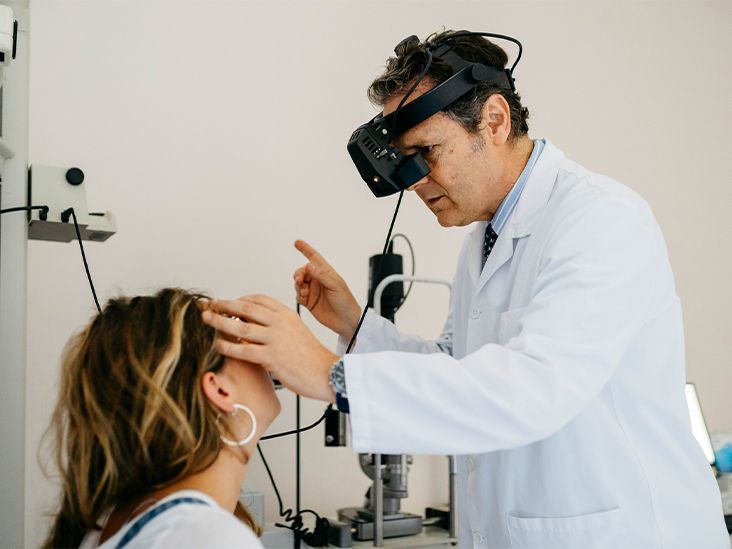Graves’ disease occurs when the thyroid gland becomes overactive and produces more thyroid hormones. This may lead to other medical complications, including issues with your heart, bones, and eyes.
Your thyroid gland, which is located at the base of the throat, makes hormones that help the body use energy. These hormones affect nearly every organ in the body.
Graves’ disease is an autoimmune disease that occurs when the immune system attacks the thyroid gland. This leads to overactivity, which is also known as hyperthyroidism.
Most of the symptoms and complications of Graves’ disease are caused by your body producing too much of these thyroid hormones. Over time, Graves’ disease may cause
Keep reading to learn more about seven possible complications of Graves’ disease and how to recognize, prevent, and treat each of them.
Thyroid eye disease (TED) is an inflammatory eye disease that occurs when your immune cells mistakenly attack the fat and connective tissues around the eyes. Graves’ disease is the number one cause of TED, which is why it’s often referred to as:
- Graves’ orbitopathy
- Graves’ ophthalmopathy
- Graves’ eye disease
Symptoms of TED may include:
- bulging eyes
- swelling
- irritation around the eyes
- retracted eyelids
- vision problems, like double vision or blurry vision
- sensitivity to light
- misalignment of the eyes
- permanent loss of vision (rare)
Treatment for TED may include medications like steroids to reduce inflammation, an IV medication called teprotumumab (Tepezza), and radiation treatment.
If you smoke, quitting can help you manage your TED symptoms. In some cases, you might need surgery to treat any permanent structural changes around the eyes.
The disease usually enters an inactive phase after 6 months to 2 years of treatment.
Thyroid hormones are essential for skeletal development and bone metabolism.
According to the British Thyroid Foundation, too much thyroid hormone — which occurs with Graves’ disease — speeds up the rate at which bone mass is lost and mineral density decreases. This can lead to
You may not have any symptoms of osteoporosis at first. As the condition progresses, however, it can increase your risk of bone fractures.
There’s no cure for osteoporosis, but medications, vitamins, and lifestyle changes can help strengthen the bones. Treatment options include:
- bisphosphonates, like alendronate (Fosamax) and ibandronate (Boniva)
- hormone therapy, such as teriparatide (Forteo)
- biologics, such as denosumab (Prolia)
- taking calcium and vitamin D supplements
- performing weight-bearing or high impact exercises like weightlifting, running, and climbing stairs
Graves’ disease can cause reddened, thickened, and rough skin on the shins and feet. This is called
This complication may affect up to
This complication is usually mild but can cause some pain and discomfort. It often resolves without treatment, but can also be treated locally with topical steroids or steroid injections.
Too much thyroid hormone can affect the cardiovascular system, leading to an increase in your heart rate and the amount of blood your heart pumps.
By making the heart work harder and faster, Graves’ disease may overload the heart. This could lead to heart failure and other serious complications, including:
- rhythm disorders (arrhythmias)
- rapid heartbeat (tachycardia)
- difficulties pumping blood
- heart failure
- high blood pressure
- heart disease
- increased risk of heart complications during surgery
- blood clots
- stroke
Depending on the specific condition, heart issues from Graves’ disease can be treated with medication, such as beta-blockers, along with an anti-thyroid agent to control the amount of thyroid hormones in your body.
Thyroid storm is considered a medical emergency. Symptoms of thyroid storm may include:
- high fever
- sweating
- fast heartbeat (tachycardia)
- vomiting
- diarrhea
- jaundice
- abdominal pain
- low blood pressure
- weakness
- delirium
- irregular heartbeat (arrhythmia)
- coma
Thyroid storm requires urgent treatment in an intensive care unit (ICU). If you have Graves’ disease and experience symptoms of thyroid storm, call 911 and seek medical attention immediately.
Excessive production of hormones in Graves’ disease causes the thyroid gland to enlarge, resulting in noticeable swelling in your neck. This is called a
Goiters are usually painless, but in some cases, they can grow large enough that they cause issues like:
- difficulty swallowing or breathing
- coughing
- choking sensation
- hoarseness in your voice
Anti-thyroid drugs used to help treat Graves’ disease may also help shrink a goiter.
Untreated Graves’ disease may lead to complications with pregnancy, including:
- miscarriage or stillbirth
- premature birth
- preeclampsia (high blood pressure)
- low birth weight
- intrauterine growth restriction (IUGR)
- placental abruption (when the placenta separates from the inner wall of the uterus)
- premature rupture of membrane (when the water breaks early)
- birth defects
If you’re planning to get pregnant and you have Graves’ disease, talk with your doctor about how to prevent pregnancy complications.
Graves’ disease could sometimes lead to blood complications like pancytopenia and agranulocytosis.
Pancytopenia
Pancytopenia is a very rare complication of Graves’ disease. It’s a condition
- decreasing the production of new hemopoietic cells in your bone marrow
- increasing the damage in current hemopoietic cells
Symptoms of pancytopenia may
- dizziness
- fatigue
- muscle weakness
- difficulty breathing
- rapid heartbeat (tachycardia)
- fever
- pale skin
- bruising more easily
- abnormal bleeding
Treatment for pancytopenia will include an anti-thyroid drug to help treat the hyperactive thyroid.
Agranulocytosis
A type of medication used to treat Graves’ disease called thionamides
Symptoms of agranulocytosis are similar to pancytopenia and may include:
- fever
- chills
- muscle weakness
- sore throat
- mouth sores
- bleeding in the mouth
- bone pain
- difficulty breathing
- fast heartbeat (tachycardia)
It’s important to get immediate medical attention if you experience any of these symptoms. Agranulocytosis impacts your immune system and may increase your risk of developing a life threatening infection.
Prompt treatment for Graves’ disease can improve your symptoms and help lower your chances of experiencing complications.
You may be able to prevent complications of Graves’ disease by:
- partnering with your doctor to manage your condition
- following your prescribed treatment plan
- getting appropriate health screenings, like bone density and blood pressure screenings
- taking any prescribed medications or supplements
- avoiding smoking
- managing stress where possible
- exercising regularly, including weight-bearing exercise
- eating foods rich in calcium, magnesium, and vitamin D
- attending preconception counseling if you’re planning to get pregnant
What happens if you leave Graves disease untreated?
If left untreated, an overactive thyroid associated with Graves disease may lead to complications that could affect your skin, heart, lungs, blood, and muscles.
What are the life threatening complications of Graves’ disease?
Some life threatening complications of Graves’ disease may include thyroid storm, cardiovascular conditions like heart disease and stroke, high risk pregnancy, and blood conditions like agranulocytosis.
Graves’ disease causes hyperthyroidism. Serious complications can occur if thyroid hormone levels aren’t brought back to normal levels.
Graves’ disease is usually treated with medications, radiation, or surgery. Talk with your doctor to help you choose the best treatment option to help prevent further complications.








